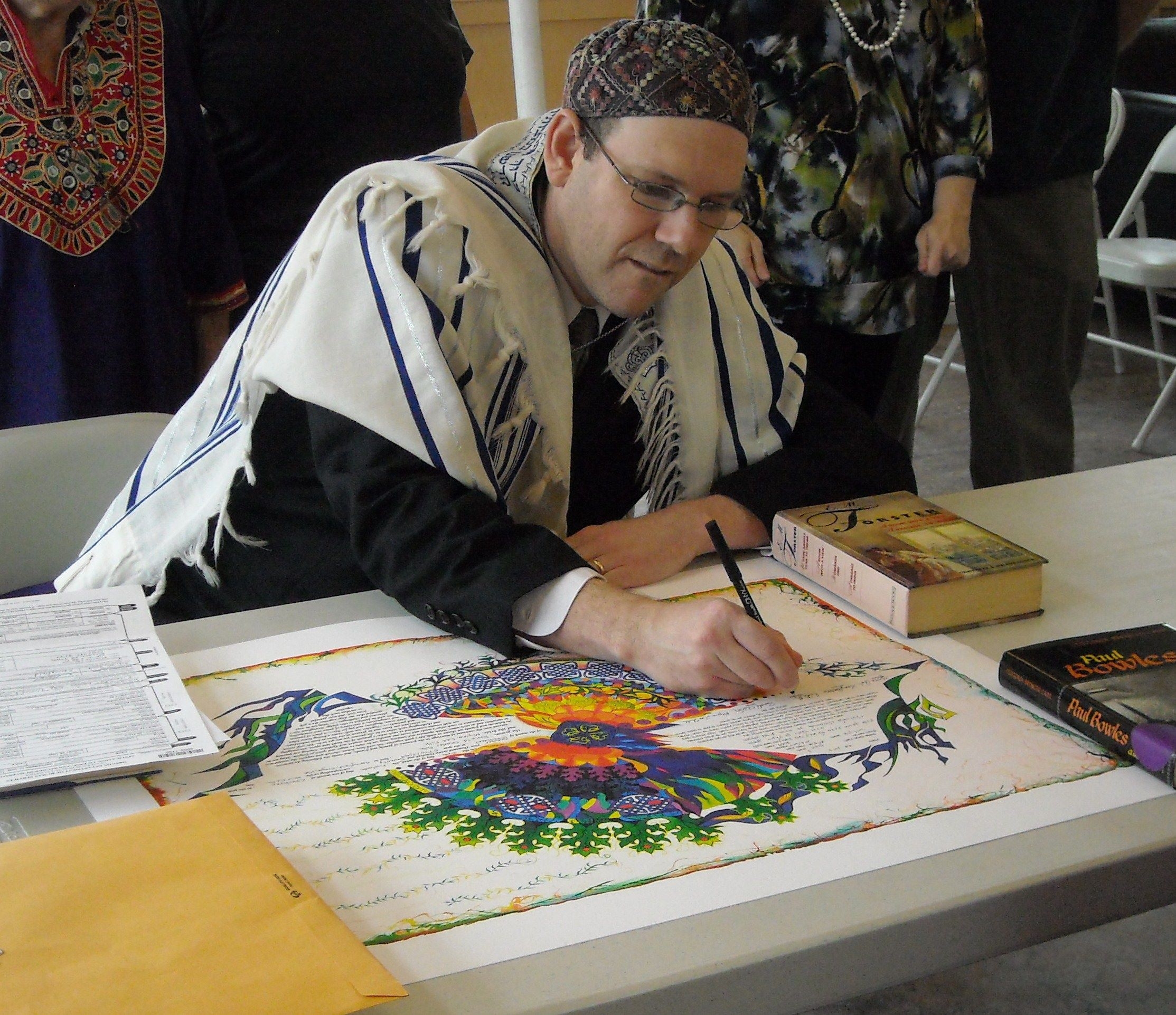Name art by Arlene Diane Spector
And Mother Leah said of her child:
“God has endowed me with a precious endowment God has given me a precious gift.” (Genesis 30:20)
The term zeved or “precious gift” is more frequently used in Aramaic than in Hebrew proper. Certain scholars have connected zeved to the Akkadian “zubalu,” “bridegroom’s gift,” hence suggesting that each newly born daughter is potentially a “precious gift” to her future bridegroom. In light of this exercise in etymology, it seems plausible that in the Sephardic tradition the ceremony of naming and celebrating the arrival of a daughter, “Bat” is called “zeved Ha Bat,” the precious gift of a daughter.
Naming was the first task undertaken by Adam. After finishing the creation of all life forms, God requested that Adam name all the newly formed creatures:
“So God brought them to Adam to see what Adam called them; whatever Adam would call a living creature, that was to be its name. Adam gave names to all.” (Genesis 2:19)
The naming of things, especially of living beings, is seen in Genesis as a role inherently human. We too have come together to follow in the footsteps of Adam, the first person. We are here to name our daughter; our precious gift, our “zeved tov.”
The naming of a person is also a way of entering them into the covenant of our forebearers. When Avram entered into the “brit” (the covenant), he became known as Avraham; Sarai his wife became Sarah. So the tradition of giving each new member of the “brit” a covenant-name arose. Today, you have been invited to witness and support our intention of entering our daughter into the “brit.” This naming ceremony is intended as an “ot-brit,” a sign and reminder of our desire to provide her with the “zekhut,” the privilege, of taking possession of the treasures of our tradition. May we be blessed with the wisdom to rear her in love so that she, like her brothers, may continually add beauty and freshness to her inheritance.
The traditional “Zeved Ha Bat” ritual begins with the chanting of the Song of Songs 2:14:
יוֹנָתִי בְּחַגְוֵי הַסֶּלַע, בְּסֵתֶר הַמַּדְרֵגָה, הַרְאִינִי אֶת-מַרְאַיִךְ, הַשְׁמִיעִנִי אֶת-קוֹלֵךְ: כִּי-קוֹלֵךְ עָרֵב, וּמַרְאֵיךְ נָאוֶה.
“O, my dove, in the cranny of the rock hidden by the cliff, let me see your face, let me hear your voice, for your voice is sweet, your face is lovely.”
Mystics who see all of Song of Songs as a sublime dialogue between God and Israel attach great significance to these lines. They are especially taken with the emphasis these verses place on “hiddeness” and the speaker’s desire to see the “veiled form of the Beloved.” The Hasidic masters explain that we are awed by the presence of the newly born because the “Tzelem Elokim,” the image of the Divine, is clearly manifest in the new infant. As an application of this, one master emphasized the need to become “child- like” in order to have our prayers heard. “Show your Divine self, your form fair, as you were in childhood, and I will let myself hear your prayers, your pleasant voice,” says God.
My mystical self senses the hidden eons of potential in this, and, in all the newly born. The potential is “hidden” the mature person, “the dove” is as one “hidden in the cranny of the rock,” in “the cliffs.” And we who behold this precious gift want to glimpse her future form. We yearn to hear the many things her pleasant voice will utter. We wonder in what ways she will personify the “Tzelem Elokim,” the Divine form.
ALL:
Song: Ha’shmiyni at Kolekh Ki-Kolekh Aarev u-Mareykh Naveh.
We are always required to “know before whom we stand.” This command becomes especially real at moments like this when we join together to celebrate a life cycle event. Today we all acknowledge that command. We gather together before Adonai, our God as witness, honoring the arrival of a new little life. Our sages have taught us that “long before a soul incarnates she searches for just the right home.” We are grateful that this gentle and beautiful soul has chosen us. We ask you all to rise and welcome her when she is brought into the sanctuary.
She will be carried in by ten women, a “minyan” or quorum, who represent the community of Israel. Each of these women, who will pass her through their chain of love, possesses qualities that we hope our daughter will acquire:
Clarity of purpose, wisdom, physical grace and confidence, generosity, strength, knowledge, a sense of humor, creativity, spiritual passion, and a reverence for all manifestations of life.
It is said that “where ten come together consciously, to praise God, the Shechinah abides.” The Shechinah is the nurturing feminine facet of the Divine. It is She who seeks union with her Beloved in order to bring redemption and peace.
It is our prayer, that from this moment on, our little one will join her ancestors Abraham and Sarah, Isaac and Rebecca, Jacob, Leah and Rachel and all following generations, who bound themselves to the covenant of God and the people of Israel. May she choose a life of holiness, following the mitzvot of our Torah, so that like today she will always be the one who merits to bring the presence of the Shechinah into our midst. In this spirit, we ask you to welcome her:
Blessed is she who comes in the name of God.
ALL:
Song: From you I receive. To you I give. Together we share and from this we live.
Carol:
According to our tradition when one destroys even a single life it is like destroying an entire world. So, too, when one brings into existence even a single life it is like creating a whole new world. In this age of choices, we would like to offer a prayer on behalf of those who chose to participate in the miracle of the birth of our daughter. May they be blessed and comforted knowing how very precious their sacrifice is to us. For through them “a new little light has entered Zion” brightening the lives of all who behold her.
Song: OR CHADASH
ALL:
אוֹר חָדָשׁ עַל צִיּוֹן תָּאִיר וְנִזְכֶּה כֻּלָּנוּ מְהֵרָה לְאוֹרוֹ
Or khadash al Tzion ta-ir
V’nizkeh khulanu m’heyra l’oro
A new light shall shine in Zion
May we all soon benefit from that light.
NAME THE CHILD
May God who blessed our mothers Sara, Rebecca, Rachel and Leah, Miriam the Prophetess, Abigail and Esther the queen, bless also this darling child. In joy may her name by called
ADIRA TIFERET NESYA
May she grow up in peace, in love, in health and happiness. May her family be blessed to see her grow in Torah in love, in fulfilling relationships, to become whole, a radiant mother of children, blessed with wisdom, clarity, kindness and honor. May this be the will of God.
ADIRA
This name, your first name, begins with the letter Aleph, just like the name of your recently deceased grandfather. It is in his honor that we selected Adira. Adira is a name that demands a great deal of you for it means “strength” or “power.” Power can be a constructive force if it is used wisely. Our prayer for you is that you grow to become a powerful, strong woman: one who can use her energy to heal and to transform herself and others; a strong individual who can face her own fears and help others face theirs; a person who does not back away from her responsibilities, but one who has direction and purpose, and who can walk proudly leading others. The power, which we hope you will gain, is the strength that comes from knowing that you are “created in the image of your Creator”—you are able, capable, creative, holy. Power is not greed in this sense; rather it is an act of great generosity; for as you grow in this knowledge of yourself, you, like your Creator, will help others empower themselves.
TIFERET
“Tiferet” was the name of my mother, your grandmother. It means beauty. On the Kabbalistic “Tree of Life,” “Tiferet” is located in the heart region. It is central and bespeaks of balance. True beauty is harmony. It is the ability to balance the mind and the heart and to bring the wisdom and creativity of thought into the world of deed or action.
For such a little one this is a “tall task,” one that many older and wiser than you have not as yet mastered. Still, it is our prayer that your names will always call you back to who you are and remind you of what you can become.
NESYA
For so many reasons you carry the name Nesya. First, you are named for the month in which you were born—”Nissan”—born as you were on the new moon of “Nissan.” As a female child this is especially appropriate because the New Moon (Rosh Hodesh) is a holy day for women. There are many midrashic explanations about the relationship of women to Rosh Hodesh. Suffice it to say that the moon reminds us of our cycles and of our hidden light; the light which currently is diminished but is daily growing stronger, brighter, and clearer.
“Nissan” was also the name of a dear and precious friend—Norman Satran—a person who brought love and warmth and humor into many of our lives. It was often his enthusiasm about our desire to find you that kept us going. It is an honor to share his name, and, in so doing, to keep the memory of the joys of friendship alive.
Finally, “Nesya” as a name unto itself and not only as a derivative of the name Nissan, carries an especially significant meaning. It translates as “miracle of God.” Each time we look at you we are overcome with the truth of this name—for surely you are proof of God’s love and concern—you are most assuredly a “miracle of God.”
THE CHAIR OF MIRIAM THE PROPHETESS
Each male child is circumcised on the chair of Elijah the prophet, the Kise shel Eliahu. The prophet, it is taught, comes to each brit milah to strengthen the resolve of parents to circumcise their sons, even at the most difficult of times.
Why is the power of prophecy deemed necessary at such times? Would it not be better to evoke the warrior spirit of Samson or Judah Maccabee? Why a prophet?
Prophets see the world as others will not and can not. Prophets see the old order transformed. They bring, to the rest of humanity, the image of a radically new world: “the lion will lie down with the lamb.” The prophet teaches that the “unreal” will become the “real:” “a little child will lead them.”
Miriam was such a person, a neviah, a prophetess, a “bringer of the message.” The first people to hear of her vision were her parents, Yocheved and Amram. The Midrash relates that “after Pharaoh decreed that all male Hebrew infants were to be thrown into the Nile, Amram thought that it would be best if all Jewish men and women divorced. That way, they wouldn’t have to suffer from Pharaoh’s horrible new law. So he divorced his wife Yocheved.
Their daughter Miriam was a special girl. She and her older brother Aaron knew that their parents were trying to help their people. Miriam spoke to her parents: “You are making a mistake. What you are doing is even worse than what Pharaoh wishes to do. He is trying to kill some of our children; by separating you will stop all children from being born. You must marry each other again.”
On that very day, Miriam led her parents under the Chupah. There was much dancing and rejoicing as couple after couple followed their example and remarried. Months later a son was born to Yocheved and Amram. He grew to become the great leader Moshe.
Miriam saw beyond what her parents and her elders saw as a “hopeless situation.” This is what made her a prophetess. She realized that life always holds more possibilities and promises than the immediate moment indicates. That God is ever present and capable of great miracles.
The truth of Miriam’s prophetic vision was again authenticated when the Israelites reached the other side of the Red Sea. When she saw her vision of her people’s liberation come true, she took a timbrel and led all the women in singing and dancing before God:
“Sing unto the Lord, who is highly exalted,” they chanted.
This chair we now dub Kise shel Miriam Ha’neviah, the Chair of Miriam the Prophetess. We place our daughter in the arms of “Miriam Ha Naviah.” We ask that this little one be endowed with the gift of Miriam’s prophetic vision. It is our hope that the prophetess will instruct her in the art of “singing and dancing before the Lord.”
ALL:
יִשְׂמְחוּ הַשָּׁמַיִם וְתָגֵל הָאָרֶץ יִרְעַם הַיָּם וּמְלוֹאוֹ טֶבֶל וְיוֹשְׁבֵיבַה
Yism’khu hashamayim v’tageyl ha’aretz
Yiram hayam umlo-o
Teyvel v’yoshveyva.
Let the heavens rejoice, let the earth be glad
Let the sea and all its fullness thunder praise
The world and all those living in it.
Selections from THE FACE OF OLD WOMAN and DAUGHTERS OF COPPER WOMAN
The knowledge of the “Shechinah” is scattered, and if we offer all women what we know, the scattered pieces can start to reform, and those who need to find courage, peace, truth and love will learn that these things are inside all of us, and can be supported by the truth of women.
There are women everywhere with fragments
when we learn to come together we are whole
when we learn to recognize the enemy
we will come to recognize what we need to know
to learn how to come together
I know the many smiling faces of my enemy
I know the pretense that is the weapon used.
I have been the enemy and learn to know myself well.
The ones who talk only from the throat
see only with two eyes
hear only with ears
but pretend to do more
are the enemy
In golden light I recognize the enemy faces
fear of our bodies
fear of our visions
fear of our healing
fear of our love
fear of sisterkind
fear of brotherkind
fear of fear
There are women everywhere with fragments
gather fragments
weave and mend
When we learn to come together we are whole
When we learn to recognize the enemy
we will know what we need to know
to learn how to come together
to learn how to weave and mend
Old woman is watching
Watching over you
in the darkness of the storm
she is watching
watching over you.
I have been searching
lost
alone
I have been searching
for so many years
I have been searching
old woman
And I find her
in
myself
In addition to the Covenant-name there are other signs of the brit. Perhaps the greatest of them is the holy Sabbath. As each of our children has come into our lives we have added one more candle to our Shabbat candelabra. Every Friday night, as we recite the Kiddush, we face these candles and see before us the twofold mitzvah of Shabbat—”Shamor V’Zachor“—”Keep and Remember.” We now add yet another “Ner Shel Shabbat,” our daughter’s. Each time we gaze upon these glowing candles, we all renew our connection with the Source of Shabbat Light
ALL:
שָׁמוֹר וְזָכוֹר בְּדִבּוּר אֶחָד, הִשְמִיעָֽנוּ אֵל הַמְּיֻחָד
יְיָ אֶחָד וּשְמוֹ אֶחָד. לְשֵׁם וּלְתִפְאֶֽרֶת וְלִתְהִלָּה
Sha’mor ve-za-chor be-di-bur e-chad.
Hish-mi-a-nu Eil ha-me-yu-chad,
Adonai e-chad u-she-mo e-chad,
Le-sheim u-le-tif-e-ret ve-li-te-hi-la.
“Children of Happiness” from DAUGHTERS OF COPPER WOMAN
By Anne Cameron
Children of Happiness are not like ordinary children. You can tell one of the Children of Happiness by the way it is different. A Child of Happiness always seems like an old soul living in a new body, and her face is very serious until she smiles, and then the sun lights up the world. You look at the eyes of a Child of Happiness and you know the child knows everything that is truly important. Children of Happiness always look not quite the same as other children. They have strong, straight legs and walk with purpose. They laugh as do all children, and they play as do all children, they talk child talk as do all children, but they are different, they are blessed, they are special, they are sacred.
They are to be cherished and protected, even at the risk of your life. They will know sadness, but will overcome it. They will know alienation for they see past and through this reality. They will endure where others cannot. They will survive where others cannot. They know love even when it is not shown to them.
They spend their lives trying to communicate the love they know.
V’AHAVTA (Dedicated to Carol Weitz Rose)
By Rinah Sheleff
And you shall love
And you shall teach
Not only in words
But in the white spaces between the black letters
In the doing
In the being
In the example of your living.
Teach, yes—but what?
If our Torah and our prophets have given us courageous women like Devora, and loving men like Yonathan, If they have shown us the marital devotion of an Elkanah and Hannah, If they have held up a vision of the End of Days, when the heart of the parent will turn toward the child, and the heart of the child toward the parent, Yet they have told us only of the pain, the suspicion and the rivalry between sisters and brothers.
Thus is our generation enjoined to teach our children truly to love one another, To carry their sheaves of compassion to a meeting place upon which a new Temple of trust can be erected.
For only when Leah and Rachel, both deceived, both longing, can embrace, and let their tears mingle.
And only when their sons can rejoice in the divine spark they discern in one another.
Only when their children’s child Amnon rise up out of his bed of shame and looks upon his sister Tamar with a love that transcends lust and domination.
Then will she return his gaze with perfect trust and say “truly we are B’nai Or.” The sons and daughters of Light.
A BLESSING
By Danny Seigel
May your eyes sparkle with the light of Torah,
and your ears hear the music of its words.
May the space between each letter of the scrolls
bring warmth and comfort to your soul.
May the syllables draw holiness from your heart,
and may this holiness be gentle and soothing
to you and all God’s creatures.
May your study be passionate,
and meanings bear more meanings
until life itself arrays itself to you
as a dazzling wedding feast.
And may your conversation
even of the commonplace,
be a blessing to all who listen to your words
and see Torah on your face.












